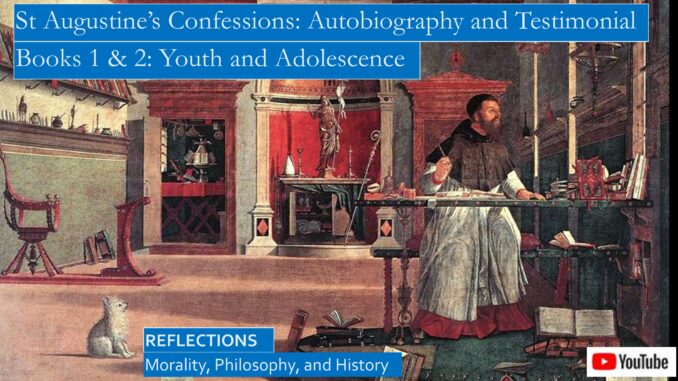
Why should we reflect on the beginning books of the Confessions by St Augustine?
What moral lessons can we learn from reflecting on the youth of St Augustine?
Why are the Confessions so relevant to modern seekers of virtue?
Why are the Confessions central to the Western Tradition, not only to Christian thinking, but also to psychology, philosophy, and the sciences?
YouTube Video: Confessions of St Augustine, Youth and Adolescence, Books 1 and 2
https://youtu.be/gdK1a3AbI9w
YouTube script, with Amazon book links:
https://www.slideshare.net/BruceStrom1/confessions-of-st-augustine-youth-and-adolescence-original-sin-and-nature-of-god-books-1-and-2
St Augustine’s Confessions: Manichaeism, NeoPlatonic Philosophy, and Monica’s Prayers, Books 3, 4, and 5
https://youtu.be/ydskqlgZSrE
St Augustine’s Confessions: Mother Monica, Concubine, Marriage, and Philosophy, Books 6 & 7
https://youtu.be/AjGbBozIReY
St Augustine’s Confessions, His Conversion, Baptism, St Monica’s Death, and Philosophy, Books 8 & 9
https://youtu.be/Vijtjxm3Ta0
St Augustine’s Confessions, Memory, Soul and Mind Book 10
https://youtu.be/xTHmGhGG6Bk
St Augustine’s Confessions, Time, Creation Genesis, Pagan Myths, and Manicheism Books 11, 12, and 13
https://youtu.be/Ff-XsE5CuSo
CONFESSIONS BY ST AUGUSTINE
How can we describe the Confessions by St Augustine?
The Confessions are a testimonial, St Augustine tells us how he embraced Christianity after he was active in the Manichean sect, which was the New Age belief system of his day. Manicheism was briefly a serious competing faith before the rise of Islam, they had a dualistic system where good and evil competed more or less evenly, and where Jesus was totally divine without a trace of mortality. Most of the surviving documents, iconography, and paintings depicting Manicheism are from China.[1]
St Augustine had many of the same questions that we hear atheists and agnostics raise today, such as: How can intelligent and sophisticated men believe in superstitions about an Almighty God? How can God be Almighty when sin has such a hold in the world? What is the nature of evil?
St Augustine also confesses how sin came to control his life, he confesses famously that he prayed to God for chastity, but not quite yet.
The Confessions are more a spiritual autobiography than an historical autobiography, St Augustine retells his life story as a parable teaching us moral lessons. The Confessions are truly a confession, a confession of sins and a confession of faith, not two confessions but the same confession, for only when we confess our sins and are truly repentant, only then can we make a genuine confession of faith, hope, and love.
The Confessions is also a psychological work, as St Augustine explores his innermost thoughts and desires, examining his hidden emotions and motivations. And likewise, it is also a philosophical work.
Keep in mind, each page was bulkier since it was manually copied, so the ancient books relate to modern chapters, and the ancient chapters are the modern sections of chapters. In the ancient world the Confessions would literally be a collection of thirteen bound books. We will primarily use the Pine-Coffin translation, but we will quote Gary Willis’ translation on occasion.
The Confessions is written in a remarkable style, St Augustine begins:
“Can any praise be worthy of the Lord’s majesty? How magnificent his strength!” Gary Willis translates this as: “Vast are you, Lord, and as vast should be your praise!” St Augustine continues, “How inscrutable his wisdom! Man is one of your creatures, and his instinct is to praise you. He bears about him the mark of death, the sign of his own sin, to remind him that you thwart the proud. But still, since he is a part of your creation, he wishes to praise you. The thought of you stirs him so deeply that he cannot be content unless he praises you, because you made us for yourself, and our hearts find no peace until they rest in you.”
The Confessions reads like the Psalms, and indeed, it melds into the text snippets of Psalms and other Bible verses. In the days before the printing press, when books had to be copied by hand, books were precious, and the time spent reading books was precious, and men sought to memorize what they read, as they did not know whether they could read that book again. Scripture memorized was internalized, and ancient preachers could recite verses off the cuff from memory in sermons, and in books dictated to secretaries, and likely the Confessions was the rare ancient book that was edited extensively.
St Augustine prays, “Grant me, Lord, to know and understand whether a man is first to pray to you for help or to praise you, and whether he must know you before he can call you to his aid. If he does not know you, how can he pray to you? For he may call for some other help, mistaking it for yours.”[2]
St Augustine is here praying to God to teach him how to pray, and he is also asking the same question that Feuerbach would ask many centuries later: When we pray to God, are we praying to the terrifying Almighty God, or are we praying to a more comfortable God we have constructed in our own souls, the God that justifies our wayward behavior?
In Gary Willis’ translation, St Augustine laments, “My soul is too cramped for you to enter, O God, widen it out. My soul is in disrepair, restore it. It is filthy in your sight, I admit and recognize this, but who can sanitize it?”[3]
SPIRITUAL AND INTELLECTUAL AUTOBIOGRAPHY
The Confessions is a spiritual and intellectual autobiography, the purpose of St Augustine is to share the evolution in his thoughts, and for St Augustine, the intellectual is the spiritual, what you believe and what you think is the wellspring of your spiritual life. His conception of the nature of God Himself is so central that he reflects on this in the opening chapters of his Confessions.
St Augustine prays to God, asking him:
“Do heaven and earth, then, contain the whole of you, since you fill them? Or, when once you have filled them, is some part of you left over because they are too small to hold you? If this is so, when you have filled heaven and earth, does that part of you which remains flow into some other place? Or is it that you have no need to be contained in anything, because you contain all things in yourself and fill them by reason of the very fact that you contain them? For the things which you fill by containing them do not sustain and support you as a water-vessel supports the liquid which fills it. Even if they were broken to pieces, you would not flow out of them and away. When you pour yourself out over us, you are not drawn down to us but draw us up to yourself: you are not scattered away, but you gather us together.”[4]
Here St Augustine is both philosopher and theologian, we must not forget that the divorce between philosophy and theology did not occur until the Enlightenment, which was a reaction to the Protestant Reformation. Here St Augustine describes God as being indescribable and inexhaustible, the true God who cannot be contained. Although God is so unimaginably expansive, yet God seeks to gather and lift up even the humblest of men to be adopted sons of His Father.
Above all, the Almighty God seeks for all of us to return to Him. St Augustine describes God’s Love for us as he prays to God:
“You love your creatures, but with a gentle love. You treasure them, but without apprehension. You grieve for wrong but suffer no pain. You can be angry and yet serene. Your works are varied, but your purpose is one and the same. You welcome all who come to you, though you never lost them.”
Why would the Almighty God need our worship? St Augustine comments on the paradox:
“You are never in need yet are glad to gain, never covetous yet you exact a return for your gifts. We give abundantly to you so that we may deserve a reward; yet which of us has anything that does not come from you? You repay us what we deserve, and yet we owe you nothing thereby.”
What is the significance of his Son assuming flesh, dying for our sins, so that we may become adopted sons of His Father? St Augustine continues,
“You release us from our debts, but you lose nothing thereby. You are my God, my Life, my holy Delight, but is this enough to say of you? Can any man say enough when he speaks of you? Yet woe betide are those who are silent about you! For even those who are most gifted with speech cannot find words to describe you.”[5]
AUGUSTINE AS A YOUTH
St Augustine discusses how everyone, even babies inherit the original sin from Adam:
“Who can recall to me the sins I committed as a baby? For in your sight no man is free from sin, not even a child who has lived only one day on earth.” St Augustine remarks on how children sometimes want to lash out: “If babies are innocent, it is not for lack of will do to harm, but for lack of strength.”
St Augustine’s extreme position on Original Sin was in reaction to his battles with the Pelagian heresy, which we will explore in later lectures. The doctrine of Original Sin means mortal men can only be saved with the assistance of the grace of God. However, Pelagius taught that man could choose to live a godly life simply by exercising his free will without needing assistance of the grace of God.[6]
Some scholars note that the writings of Pelagius have not survived, so we do not know how extreme his teachings actually were. Christians disagree on whether mortal men have the free will to cooperate with God’s grace, choosing to accept or deny it.
St Augustine observes that babies often show jealousy at attention shown to their siblings. Ever the scientist, he speculates on how infants learn language from observing facial expressions and gestures, which he terms a universal language, [7] notions that the modern scholar Noam Chomsky would elaborate on in his theories of how infants are born with a universal grammar that are essential in learning language.[8]
St Augustine always questioned whether current church practice furthered the two-fold Love of God and neighbor, and if they did not, he sought to change the practice. As a bishop he remembers how his mother Monica, after he had recovered from a severe illness during his youth, “postponed my washing in the waters of baptism” for fear that he would if he were baptized too soon, he “would defile himself again with sin,” and “the guilt of pollution would be greater and more dangerous.”
In the early days of the church penance was much more severe than it is today. Ancient Christians required penance that was so severe for serious mortal sins that believers delayed their baptism until mature adulthood. Notably Emperor Constantine was baptized on his deathbed, since as a monarch he would be compelled to wage war, thus committing great sins while protecting the empire.
But St Augustine regrets that early baptism would have provided “healing at once,” ensuring that his “soul would receive salvation,”[9] leading the church to adopt infant baptism rather than delaying baptism until the Christian was a responsible adult. His views on original sin influenced the Church to baptize children sooner rather than later.
St Augustine was born less than a century after Emperor Constantine legalized Christianity, and during his lifetime the Roman Empire became more of a Christian empire, though there were still prominent pagans in his lifetime. His schooling was the classical training in Latin and Greek literature, complaining how his teachers coerced him with punishment to learn Greek, noting how students “learn better in a free spirit of curiosity than under fear and compulsion.”[10] He would later learn how to read Greek with difficulty, but as a bishop he did not need to become fluent in Greek.
We noted how the Stoic philosophers referred to God and Zeus interchangeably as though he were a monotheistic god, thought the proper term is henotheistic since Zeus, known to the Romans as Jupiter, is seen as the personification of all the gods. But St Augustine notes the incompatibility between the notion that Jupiter is a moral god with the myths: “The traditional education taught me that Jupiter punishes the wicked with his thunderbolts and yet commits adultery himself.” He quotes Cicero, “Homer invented these stories and attributed human sins to the gods. He would have done better to provide men with examples of divine goodness.”[11]
St Augustine compares the profligacy of his youth to the parable of the “prodigal son who went to live in a distant land to waste in dissipation all the wealth his father has given him.” He prays to the Lord: “For you were the Father who gave him riches. You loved him when he set out and you love him still more when he came home without a penny. But he set his heart on pleasure and his soul was blinded, and this blindness was the measure of the distance he travelled away from you, so that he could not see your face.”[12]
This is not a standard autobiography, there are occasional references that reveal he has siblings, but we know little about them, not even their names. St Augustine tells us about his evolving inner life, he is less concerned about the outer life, and tells us little about events in his childhood.
St Augustine tells us in the end of the first book, “My sin was this, that as a boy I looked for pleasure, beauty, and truth not in God but in myself and his other creatures, and the search led me instead to pain, confusion, and error.” He later teaches us that true happiness comes from Loving God and loving our neighbor.
St Augustine then prays to God, “I thank you for your gifts and beg you to preserve and keep them for me. Keep me, too, and so your gifts will grow and reach perfection and I shall be with you myself, for I should not even exist if it were not by your gift.”[13]
AUGUSTINE AS AN ADOLESCENT
As a bishop, St Augustine remembers his adolescence:
“I cared for nothing but to love and be loved. But my love went beyond the affection of one mind for another, beyond the arc of the bright beam of friendship. Bodily desire, like a morass, and adolescent sex welling up with me exuded mists which clouded over and obscured my heart, so that I could not distinguish the clear light of true love from the murk of lust. Love and lust together seethed within me. In my tender youth, they swept me away over the precipice of my body’s appetites and plunged me into the whirlpool of sin.”[14]
Here St Augustine is discussing concupiscence, a topic he examined in several works that are quoted in the Catholic Catechism. Concupiscence is not something that only afflicts men before marriage, concupiscence is seeking pleasure or gain from your neighbor without truly caring for your neighbor, seeing our neighbors as objects or servants, not treating our neighbors with compassion, not respecting their dignity as persons. Although his teachings appear on concupiscence appear harsh to modern ears, they were less extreme than the views of Musonius Rufus, a leading Stoic philosopher.
St Augustine and Musonius Rufus on Concupiscence:
https://youtu.be/-wv6bVeG74A
The ancient world’s views on concupiscence and their supposed Victorian views on intimacy was a consequence of how different the ancient world was from the modern world. Childbirth is totally safe in modern hospitals, but in the ancient world it was so deadly that aristocratic Roman women updated their wills when they became pregnant, as dying in childbirth was common. Also, the infant mortality rate was sky-high, only half of all children survived childhood, and only ten percent survived to a ripe old age.
Ordinary Life in Ancient Greece, including child mortality:
https://youtu.be/vl8KGL5Yx2w
Although his mother was a Christian, his father was a pagan. St Augustine is grateful that his father supported his education. His parents recognized his brilliance and potential and sacrificed to ensure him a good education in rhetoric, which was the path to a professional career in the early Roman Empire. However, looking back as a bishop, St Augustine remembered that his father cared little for his godliness or chastity, only caring whether he exceled in his rhetorical studies. He remembered how his father embarrassed him when noticed his young son’s erection at the public bath, he excitedly told his mother Monica, Now we can look forward to grandchildren![15]
YOUNG AUGUSTINE AND FRIENDS STEAL SOME PEARS
St Augustine, as a bishop, remembers one incident in detail, how he and his friends stole pears from a neighbor’s orchard. Many modern readers read this and ask, Why does he dwell so deeply on such childish mischief? What children don’t get into minor trouble occasionally? This hardly seems like delinquent behavior.
As a bishop, St Augustine is using this minor incident as an allegory to teach us a greater lesson. St. Augustine starts Book 2:
“I must now carry my thoughts back to the abominable things I did in these days, the sins of the flesh which defiled my soul. I do this, my God, not because I love these sins, but so that I may Love You. For love of your love, I shall retrace my wicked ways. The memory is bitter, but it will help me to savor your sweetness, the sweetness that does not deceive but brings real joy and never fails.”[16]
St. Augustine always had friends; he saw true friendship as a mirror of our Love for God. Indeed, his early Confessions were confessions about his friendships. But friendships are only desirable when they enhance in our heart our Love of God. St Augustine teaches us that “friendship among men is a delightful bond, uniting many souls in one.” But friendship can lead us to sin when we are tempted to abandon God’s truth and law, and God Himself. Earthly friendships “can give joy, though not such joy as my God, who made them all, can give.” [17]
This concept that close friendships are only desirable when they increase in us our Love of God was also taught by St John of the Cross in his Dark Night of the Soul.
What does St Augustine remember about the pear-stealing incident?
“For of what I stole I already had plenty,” “and I had no wish to enjoy the things I coveted by stealing, but only to enjoy the theft itself and the sin.” “We took away an enormous quantity of pears, not to eat them ourselves, but simply to throw them to the pigs. Perhaps we ate some of them, but our real pleasure consisted of doing something that was forbidden.” “The evil in me was foul, but I loved it. I loved my own perdition and my own faults, not the things for which I committed wrong, but the wrong itself. My soul was vicious and broke away from your safekeeping to seek its own destruction, looking for no profit in disgrace but only for disgrace itself.”[18]
Is this allegory comparable to when the rebellious angels were thrown out of heaven? Obviously, the stealing of the pears is a replaying of the original sin of the eating of the forbidden apple in the garden, and the memory of this theft obviously bothered St. Augustine deeply, this theft bothered him that night, this theft bothered him for the decades following, this theft was a haunted memory after his conversion, and this theft caused his soul to groan when he writes about it in his Confessions.
Peer pressure was also part of the ancient world. St Augustine remembers from his teen years,
“I was so blind to the truth that among my companions I was ashamed to be less dissolute than they were. For I heard them bragging of their depravity, and the greater the sin the more they glorified in it, so that I took pleasure in the same vices not only for the enjoyment of what I did, but also for the applause that I won.”
St Augustine remembers, “Nothing deserves to be despised more than vice; yet I gave in more and more to vice simply in order not to be despised. If I had not sinned enough to rival other sinners, I used to pretend that I had done things I had not done at all, because I was afraid that innocence would be taken for cowardice and chastity for weakness.”[19]
The sin of the theft of the pears are like all the sins all of us sin. What motivates us to sin? St. Augustine confesses,
“It was not the pears that my unhappy soul desired. I had plenty of my own, better than those, and I only picked them so that I might steal. For no sooner had I picked them than I threw them away, and tasted nothing in them but my own sin, which I relished and enjoyed. If any part of one of those pears passed my lips, it was the sin that gave it flavor.”[20]
“For the sake of a laugh, a little sport, I was glad to do harm and anxious to damage another; and that without thought of profit for myself or retaliation for injuries received!”[21]
In the garden with the forbidden fruit in the first book of his Chronicles of Narnia, CS Lewis writes how the wicked white witch greedily ate of the forbidden fruit, grabbing and biting into pear after pear, most of these pears bitten only once and disrespectfully and disdainfully tossed on the ground, the witch laughing and drooling black blood and spit as she savored the sin of the meat of the fruit that would damn her soul. In this story the good lion Aslan offers this same fruit to a boy whose mother is dying, but he hesitates to take this healing fruit, for he saw what happened to the wicked white witch. But Aslan bid the boy to take the fruit, for the fruit that is given by God to eat is healing fruit, and it was sweet to the taste and healing to the soul and body.
So it is with sin, sin steals away that which it promises, while the Lord gives to his beloved in abundance. St. Augustine gives us many examples:
“The lustful use caresses to win the love they crave for, yet no caress is sweeter than Your Love, O God, and no love is more rewarding than the love of Your truth, which shines in beauty above all else.” “The covetous want many possessions for themselves: but You, O Lord, possess all. The envious struggle for preferment: but what is to be preferred before You, O God?” “Anger demands revenge: but what vengeance is as just as Yours, O God?” “Cruelty is the weapon of the powerful, used make others fear them: yet no one is to be feared but God alone.”
“So, the soul defiles with unchaste love when it turns away from You and looks elsewhere for things which it cannot find pure and unsullied except by returning to You, O Lord.”[22]
Sinfulness brings us misery rather than happiness. The bishop Augustine remembers that his theft of the pears “brought me no happiness, for what harvest did I reap from acts which now make me blush?” “I loved nothing in it except the thieving, although I cannot truly speak of it as something I could love, and I was only the more miserable because of it.”[23]
May we pray as St. Augustine prays,
“Grant my prayer, O Lord, and do not allow my soul to wilt under the discipline which you prescribe. Let me not tire of thanking you for your mercy in rescuing me from all my wicked ways, so that you may be sweeter to me than all the joys which used to tempt me; so that I may love you most intensely and clasp your hand with all the power of my devotion; so that you may save me from all temptation until the end of my days.”
St Augustine prays this prayer near the end of Book 2:
“I will Love you Lord, and thank You, and praise Your Name, because You have forgiven me such great sins and such wicked deeds. I acknowledge that it was by your grace and mercy that you melted away my sins like ice. I acknowledge, too, that by your grace I was preserved from whatever sins I did not commit, for there was no knowing what I might have done, since I loved evil even if it served no purpose. I avow that you have forgiven me all, both the sins which I committed of my own accord and those which by your guidance I was spared from committing.”[24]
DISCUSSION OF THE SOURCES
St Augustine was an excellent orator and writer, but the Confessions is the most beautifully crafted and closely edited of his works, and there are many translations. The RS Pine-Coffin translation is the main translation I used, but I also consulted Gary Willis’ translation, which has a reputation for originality and elegance. Henry Chadwick also translated the Confessions; I am sure his translation is also excellent.
The translation of the Confessions in the Nicene and Post-Nicene Fathers is dated, though we have found this translation to be acceptable for his minor works, and we like to scan the footnotes, and it summarizes the contents of each book in the table of contents. This version is useful because the applicable sections in his Retractions, in which St Augustine offers comments and corrections to his major works near the end of his life, is included before the Confessions. In his Retractions, he notes that the Confessions have benefited many Christians of his day. St Augustine notes in his Retractions that his “Confessions, whether they refer to my evil or good, praise the just and good God, and stimulate the heart and mind of man to approach the Loving God.”
There are hundreds of medieval manuscripts of the Confessions that have survived, and nine surviving Carolingian minuscule manuscripts from the ninth and tenth centuries.[25]
Professor Philip Cary of the Teaching Company has a lecture series on Augustine: Philosopher and Saint, this is one of my favorite sets of lectures. Back in the day, he was one of the most popular Teaching Company lecturers. It has not been transferred to Wondrium, perhaps for health reasons.
Professors Cook and Herzman also recorded lectures on the Confessions, his lectures are on Wondrium. These are basic lectures, derived from lectures for the undergraduate student who has no background in ancient history.
Professor Dorsey Armstrong’s Great Courses, also Wondrium, lectures on the Great Minds of the Medieval World begin with St Augustine, then cover St Ambrose, who converted him back to Christianity, then Gregory the Great and many other subsequent medieval minds, who built on the works of St Augustine.
[1] https://en.wikipedia.org/wiki/Manichaeism
[2] St Augustine, Confessions, translated by RS Pine-Coffin (New York: Dorset Press, 1986, 1961, originally 400 AD), Book 1, Chapter 1, p. 21, Gary Willis translation (New York: Penguin Books, 2006, 2002), p. 3.
[3] St Augustine, Confessions, Gary Willis translation, Book 1, Chapter 6, p. 5.
[4] St Augustine, Confessions, Book 1, Chapter 3, p. 22.
[5] St Augustine, Confessions, Book 1, Chapter 4, p. 23.
[6] https://en.wikipedia.org/wiki/Pelagius
[7] St Augustine, Confessions, Book 1, Chapter 8, pp. 27-28.
[8] https://en.wikipedia.org/wiki/Universal_grammar
[9] St Augustine, Confessions, Book 1, Chapter 11, pp. 31-32.
[10] St Augustine, Confessions, Book 1, Chapter 14, p. 35.
[11] St Augustine, Confessions, Book 1, Chapter 16, p. 36.
[12] St Augustine, Confessions, Book 1, Chapter 18, p. 38.
[13] St Augustine, Confessions, Book 1, Chapter 20, pp. 41-42.
[14] St Augustine, Confessions, Book 2, Chapter 2, p. 43.
[15] St Augustine, Confessions, Book 2, Chapter 3, p. 45.
[16] St Augustine, Confessions, Book 2, Chapter 1, p. 43.
[17] St Augustine, Confessions, Book 2, Chapter 5, p. 48.
[18] St Augustine, Confessions, Book 2, Chapter 4, pp. 47-48.
[19] St Augustine, Confessions, Book 2, Chapter 3, p. 46.
[20] St Augustine, Confessions, Book 2, Chapter 6, p. 49.
[21] St Augustine, Confessions, Book 2, Chapter 9, p. 52.
[22] St Augustine, Confessions, Book 2, Chapter 6, pp. 49-50.
[23] St Augustine, Confessions, Book 2, Chapter 8, p. 51.
[24] St Augustine, Confessions, Book 2, Chapter 7, p. 51.
[25] https://www.historyofinformation.com/detail.php?entryid=2489

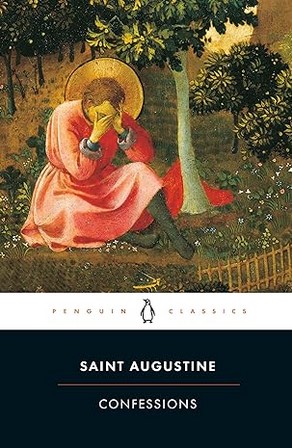
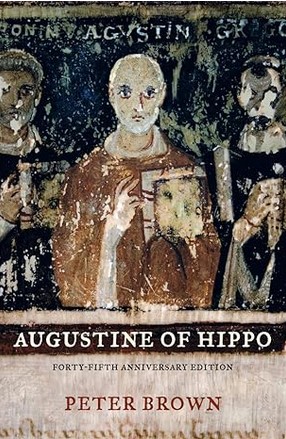
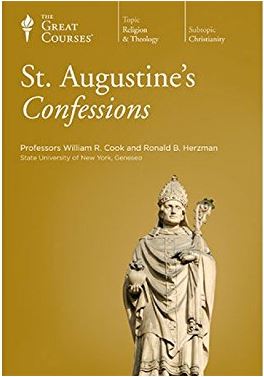
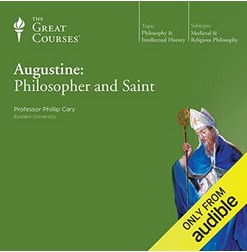
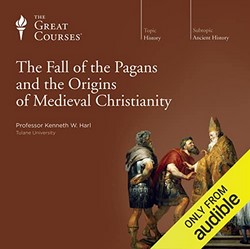
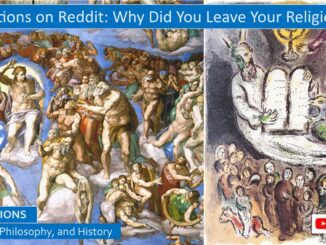
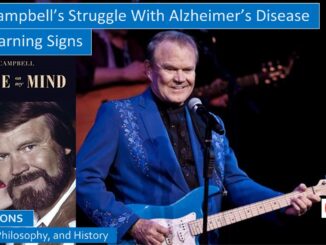
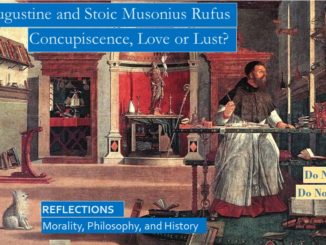
3 Trackbacks / Pingbacks